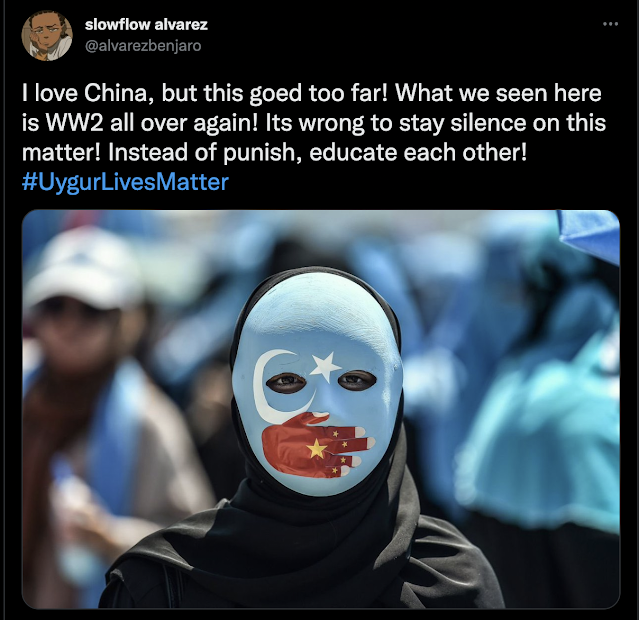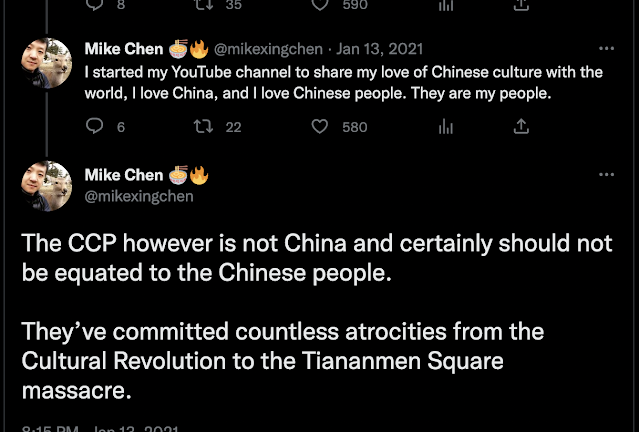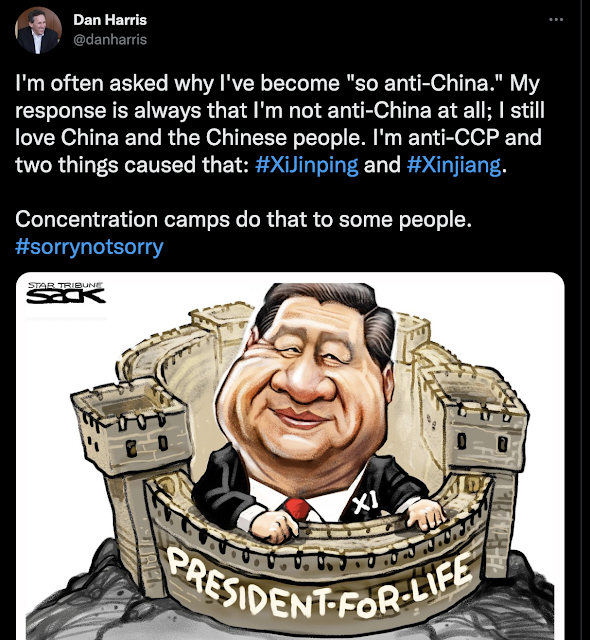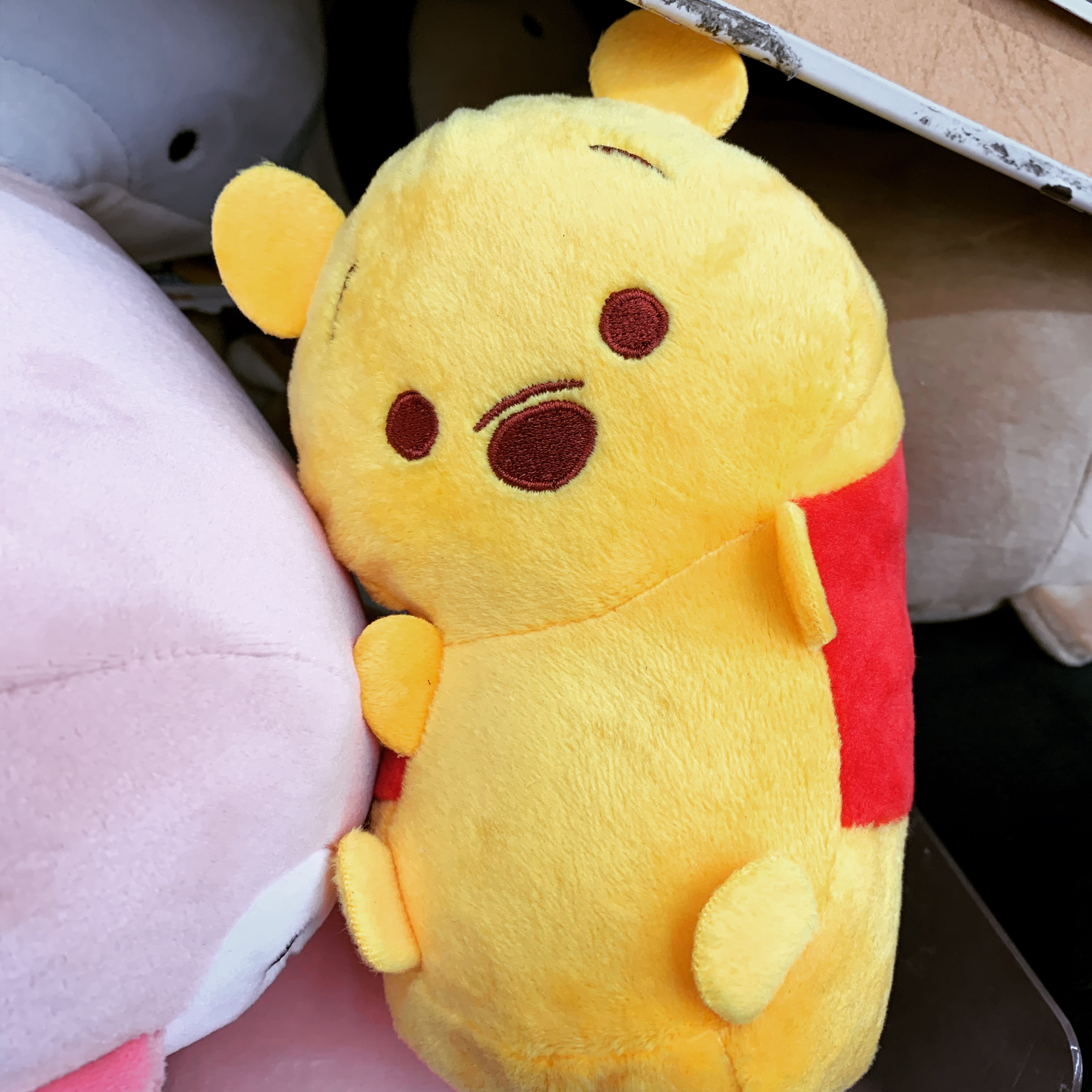I have to get something off my chest. A dark confession, the opposite of what I feel is expected of me. You see, as much as I feel expected to say otherwise, I don't love China.
When favorably discussing Taiwanese independence, sovereignty or identity, or saying anything negative about the CCP, it seems as though so many people feel the need to insert a little "I love China, but..." or "I deeply love the people and culture of China, however..." Sometimes this is a single sentence header; sometimes it stretches out to cover an entire paragraph detailing some positive experience or perspective on China as a country, to emphasize the differentiation of the nation and people from the government.
Here are just a few random examples from a quick search:
That's all fine, if you truly "love China" no one should stop you from saying so, but I don't love China.
I certainly understand this, however. I've even engaged in it. One doesn't want to imply dislike or hatred of a group of people, or aim derision at an entire nation in all its complexities. Of course, engaging in "Screw China!" rhetoric is fundamentally racist, when China is a vast, complex nation full of everyday people who don't deserve to be lumped in with their genocidal government.
Nobody actively insists this is a necessary addition to what one really wants to say, but I see it so often and feel compelled to include it. The consequence is often being labeled a "China-hater" (China as in the country, not the government) or worse, of perpetuating anti-Asian hate. Of course, tankies, aggressive Han supremacist trolls and CCP shills (both paid and unpaid) will accuse pro-Taiwan advocates and CCP critics of all of this anyway, but it feels like a necessary preliminary step to defend oneself.
But here's the thing.
I truly don't love China.
I've felt unspoken pressure to preface pro-Taiwan advocacy or criticism of the brutal, genocidal, authoritarian CCP with exhortations that are simply not sincere. And there's a strong likelihood that I'll attract criticism for simply being honest about this.
Let's be clear: I don't hate China, either. I certainly don't hate Chinese citizens. It's ridiculous to hate a whole nation -- no place, especially not one so large, complex and diverse in cultures, languages and history, could possibly deserve an opinion so simplistic and dismissive.
As someone who has lived in China and returned several times since, I simply have no specific affection for the country. Although I can never know what it's like to be Chinese or be a PRC citizen, I've experienced some version of life in China, and not in the big east coast cities (I've visited those, but my actual life there was in Guizhou). That experience resulted in mixed feelings.
Chinese histories -- the many histories of the regions now considered China -- are fascinating. The many cultures of China are, too. I've fallen out of love with the Mandarin language, but am enthusiastic about learning Taiwanese. Clearly Sinitic languages are of great interest to me. There are plenty of astounding things to see in China. I've seen them and been astounded. To touch on more everyday matters, the food is great (usually -- it's not always prepared well, as in any country) and the people are generally pretty nice. Daily life, at least for an expat, was fairly safe when I lived there.
But you know what else I experienced in China? Horrendous misogyny, aimed not at me but at Chinese women I knew. Their stories aren't really mine to tell, but I am pretty sure this attitude isn't anecdotal.
I may have felt safe enough on the streets, .but I didn't feel the same way expressing any kind of opinion. That included fairly anodyne ones like "I think Taiwanese should get to decide if they want to be part of the PRC", which isn't even close to the pro-independence diehard that I am today. In contrast to Taiwan where one can freely discuss 228 or the White Terror, I never mentioned Tiananmen Square, because I knew I couldn't. Mail sometimes arrived pre-opened. People occasionally told me controversial opinions, such as "I was at Tiananmen Square so I know how fucked up things are", "We're not allowed to fully practice Uyghur culture, they are our oppressors" and "I'd like to protest the government but they'd just kill us."
I kept those confessions to myself while in China -- what other choice was there?
That's not even getting into how sick the pollution made me, multiple times, nor the trouble of accessing actual international news.
There were so many reasons why I chose to leave at the end of my year in China, but stuck around in Taiwan. My first six months in Taiwan were rough, but I felt a budding affection for the country which only grew. In China, that feeling never came.
In fact, the part of China I liked most was East Turkestan (known to some as Xinjiang), where people don't like the CCP, aren't Chinese and don't seem to really want to be part of China. I feel nothing but grief for what has happened there since my visit so many years ago.
I've lived in four countries in my life -- the United States, China, India and Taiwan. I feel affection for India despite its flaws, and actually do love Taiwan. I chose to settle here, after all. My feelings about the US are more positive than about China, but I wouldn't say I "love" it. I can't say why China was my least favorite place to live, or why it didn't capture my affection in the same way as other places I've intentionally moved to. India is hardly perfect, and Taiwan has its negatives. But China just didn't do it for me.
Life there wasn't all all awful. There was good and bad, and those bad experiences above were balanced somewhat by positive ones. I made friends, began learning Mandarin, ate some amazing food, saw some stupendous scenic, cultural and historic sites. Very few experiences are all bad. And that's how I feel about China: good and bad.
Honestly, regardless of what I think about any given government, I feel fairly neutral towards most countries. At best, I've enjoyed traveling in them and learning about them, but I wouldn't describe my emotions towards them as "love". I went to Sri Lanka and enjoyed it immensely, but that's about it. I went to Myanmar and had many positive experiences, but I wouldn't say I felt "love". Our honeymoon was a bus trip from Panama to Guatemala. It was amazing, and each country fascinating in its own way. But do I "love" Nicaragua? I wouldn't say so. I do care about people, but feel no clear need to love a country absent some specific yet ineffable catalyst.
Countries are countries -- they all have their good and bad points, some have more good than bad, and most have intractable problems but also things to like. People are also just people: most are good, many are nice, a few are rotten. That's true anywhere in the world you go. Even general safety is linked not to how "good" people are, but more to economic factors.
So why, exactly, should I "love" China? What does it matter that I lived there? What does it matter that I live in Taiwan now? And what does it matter that I'm pro-Taiwan? I still don't have to "love" China in order to criticize it, and I'm sick of feeling tacit pressure to say I do.
It feels like pre-emptive self-defense, as though one needs to justify supporting for Taiwan, Tibet or East Turkestan. As though one needs a caveat in order to oppose the Uyghur genocide, or criticize the CCP. But I neither want nor need to prove myself, to add an insincere caveat, to speak the truth about other countries like Taiwan, and other cultures like Tibetan and Uyghur.
The case for Taiwan, among others, is just and right all on its own. It's time to stop falling over ourselves to proclaim "love" for China just because CCP shills will twist support for these causes into "anti-Asian hate" or "you're racist against Chinese people!" when that's simply not the case.
I do hate the CCP: they certainly have no business running a country given all they've done to harm China (and then claim credit when they stop or reverse just some of the harm they themselves inflicted). They should be shunted out of existence. Xi Jinping should face charges before an international court for crimes against humanity and spend the rest of his life not as the dictator of the world's most populous country, but alone in a deep dark hole. I cannot describe the degree to which I loathe that government.
But there are many governments I don't care for. Many run countries I like quite a bit, or feel neutrally toward! I appreciate Indian democracy but acknowledge the flaws of the Indian government (certainly I'm no fan of the BJP). The US government has some obvious problems. Taiwan has an admirable democracy but the government sometimes makes me feel like bashing my head against a wall. At least they're democracies, though. The CCP -- brutal, non-democratic but ultimately not the only factor in my feelings about China -- is an entirely different thing.
But you know what? Whatever. I don't love China. I don't love China! It feels so freeing to just be honest about that. Living there had its upsides and drawbacks, but in the end the drawbacks outweigh the upsides, and I have no regrets about choosing never to return. I do miss things like 酸辣米皮 -- Guizhou-style hot and sour flat noodles. It's a shame I will probably never again see places I actually did love, such as East Turkestan, the Miao areas around Kaili, and Hong Kong. But I don't think China is a safe destination for public supporters of Taiwan. Oh well.
I support Taiwan and Taiwanese independence. Taiwan is a country. Taiwan has a unique history and culture, and most Taiwanese do not identify as Chinese. China has no business claiming Taiwan and is absolutely in the wrong for threatening a bloody, violent war. Period. They are the provocateurs -- the only provocateurs. Not Taiwan, not the United States.
That same government will tell you that this stance is akin to hating China as a country, which is essentially the same as anti-Asian racism. That is a lie, and I reject it.
The CCP should fall, though nobody but the people of China can make that happen. I want only good things for Chinese citizens, but don't know how to support them. I wish I did.
All of that is true, and also, I don't love China.













